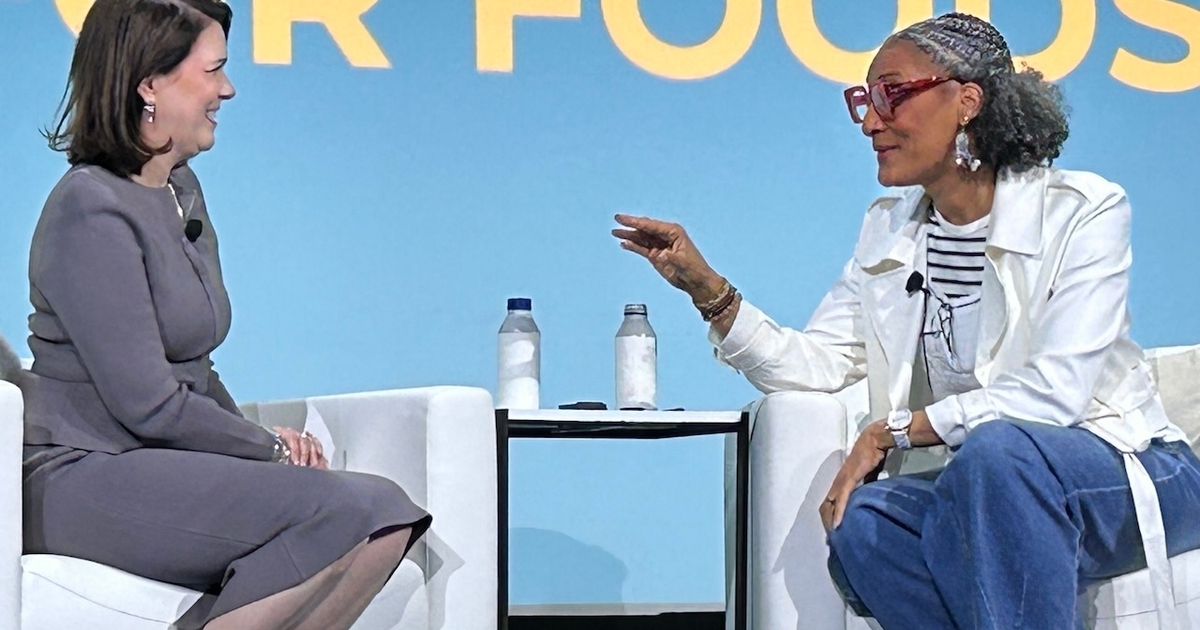
Carla Hall has always wanted to be an entertainer.
“I wanted to be the Black Carol Burnett at 12,” she told the audience at the National Restaurant Show, where she discussed her career, her social media strategy, her approach to artificial intelligence, and more in a conversation with National Restaurant Association president and chief executive officer Michelle Korsmo.
Hall came to fame as a contestant on Bravo’s Top Chef at age 44, after careers in modeling and then catering. She didn’t win, but her charm and personality led to more TV appearances as well as a gig as co-host on the Emmy award-winning ABC food-oriented talk show The Chew.
She’s also the author of four cookbooks and briefly had a restaurant in Brooklyn, N.Y., Carla Hall’s Southern Kitchen, selling Nashville hot chicken and vegetarian sides.
It closed after a year — “I have PTSD from that restaurant,” she said — but she doesn’t consider that venture to be a failure, nor was her loss on Top Chef.
“If I’d won Top Chef, I wouldn’t have been on the Chew,” she said, and the research & development she did for her restaurant were leveraged into products like the ready-to-bake cornbread mix and hot chicken she sells via direct-to-consumer channels such as QVC and Goldbelly.
“Every ‘failure’ was a stepping stone in the right direction,” she said.
Besides, Hall, like many chefs, likes to stay on her toes.
“I love change; I know that about myself,” she said. “I don’t mind starting from the bottom and recreating myself.”
She also knows what she’s good at, and what she needs help with.
Hall said she’s an ideas person, “but I need someone to help execute those ideas,” she said, as well as someone to tell her when her ideas are bad. So her assistant is the opposite of a “yes” person, and the person in charge of her social media is a data expert.
That’s important, she said, because it enables her to create content that people are already searching for.
“If they’re searching biscuits, I’m going to make a biscuit casserole,” she said.
There’s nothing wrong with following trends, she added. “People are more willing to try things they’ve seen on television. … you can be on the trend, but you can be on your trend in your own way.”
She also listens to her followers. They’re asking for gluten-free and vegetarian food, so she makes that.
“When you’re thinking about social media, think of it as a conversation.”
Don’t bother with trying to go viral, she said. Besides the fact that you can’t manufacture virality, it’s not sustainable, she said. She went viral by tripping and falling on stage, but that doesn’t mean she’s going to keep trying to fall down.
Nor should you create food so it will go viral: It will give you a brief bump in business, but then customers will move on to the next thing.
Besides, “if you think about the result, you forget about the process,” she said.
Korsmo asked Hall about AI, and she said, “We’re not getting that toothpaste back in the tube. If y’all don’t like it, it’s you.”
Besides, she said, it’s a useful tool. “I would challenge you to ask [AI], ‘How can I use you in my business?’ Talk to them like a manager,” she said. It can analyze patterns, look up events, or weather or traffic patterns that could affect your business, and handle tedious tasks like inventory.
“You’re treating it like a team member … It’s not going to replace someone’s job; it’s going to make you more efficient,” she said.
Hall also had advice for developing staff.
“When you are building a team, you have to see where they light up … an employee who believes in themselves, and you’re mentoring, they’re going to be so loyal to you, and you get retention,” she said.
Contact Bret Thorn at [email protected]





